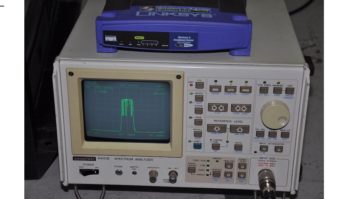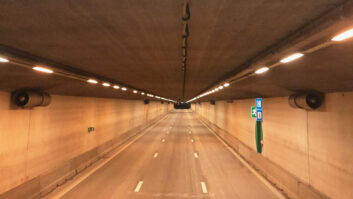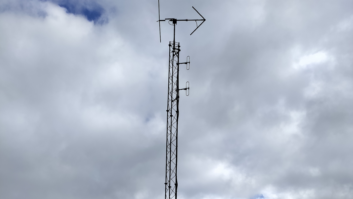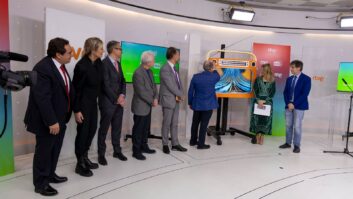LUTON, England — Plans to add more localized DAB multiplexes across the United Kingdom are moving forward quickly. A new “third tier” of DAB services is now expected to start rolling out across the country from next year.

Delegates attend the CMA’s DAB event in Luton on March 25.

Peter Madry from Ofcom, left, and Ian O’Neill from DCM discuss localized DAB developments.
Following the introduction of new legislation facilitating such developments, in March the British Community Media Association (CMA) organized an industry event, SSDAB & Community Radio: Past, Present, Future, to examine the specifics of how such services will be delivered.
SPECIFICS
Held at the University of Bedfordshire, near London, contributors included representatives of the U.K. government and the broadcast radio regulator, Ofcom, alongside various technical experts and some of those who have been operating trial versions of localized DAB multiplexes on a temporary basis since 2015.
Attendees heard from trial DAB multiplex operators in Brighton, Portsmouth, Manchester and Norwich. Although all felt the trials to have been largely successful, similarly, all were concerned about coverage problems at the very low-power levels (100–200 W EMRP) used to date. In-building signal penetration was felt to be of particular concern, especially in urban centers. Operators highlighted the importance of achieving “equivalence of service” — delivering similar levels of signal field strength within their service areas, when compared to those provided by other DAB multiplexes operating locally.
To avoid the creation of quasi-national networks, similar to those operating on existing larger local and regional DAB multiplexes, the importance of not-for-profit based, local, ownership and control was highlighted. Furthermore, the CMA is campaigning to see those involved in the ownership of existing larger DAB multiplexes barred from any involvement in the ownership of forthcoming localized DAB operations.

The CMA also suggests that ownership of new localized DAB multiplexes should be limited to one per operating company, the same as is currently the case for FM and AM community radio services across the U.K. Some existing DAB trial multiplex operators and prospective operators agreed with such an approach. However, concerns were also raised about local groups not being willing to take on the multiplex operator role independently, thereby risking some areas needlessly being left without localized DAB availability.
Also contributing to the debate were representatives of government, Ian O’Neill from the Department for Media, Culture & Sport and Peter Madry from Ofcom. Focusing on their experience of the current trials, they also explained plans to develop detailed regulatory approaches in the light of discussions with industry and the public. Both DCMS and Ofcom expect to launch their individual consultations later this year.
Lawrie Hallett reports on the industry for Radio World from Norwich, England.












